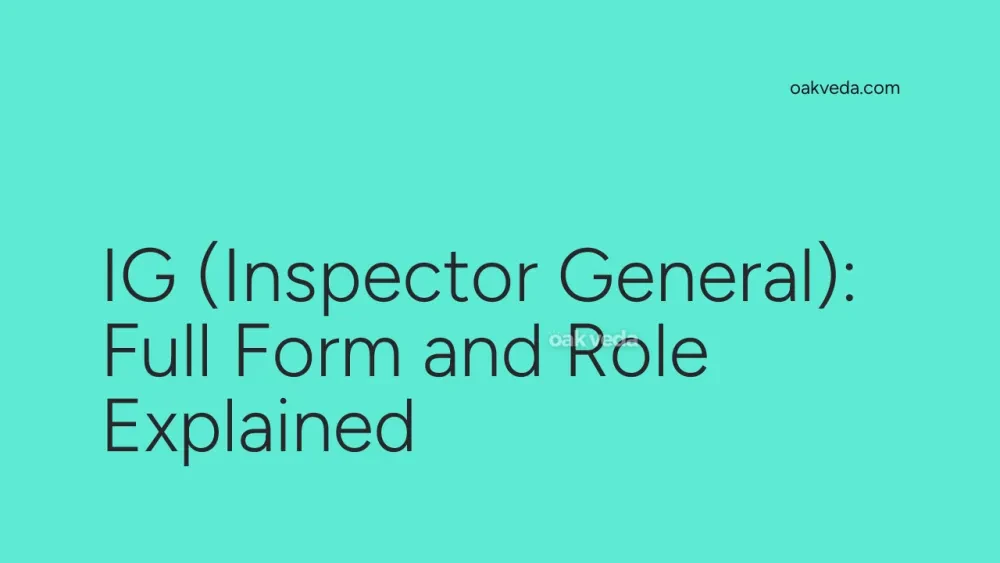
What is the Full Form of IG?
The full form of IG is Inspector General. In the context of law enforcement, IG typically refers to the Inspector General of Police, a senior-ranking officer responsible for overseeing large regional commands or entire police forces in many countries.
What is Inspector General of Police?
The Inspector General of Police is a high-ranking official within the police hierarchy. This position is crucial in maintaining law and order, supervising police operations, and ensuring the effective functioning of the police force. The IG plays a pivotal role in shaping policies, implementing strategies, and coordinating with various government agencies to enhance public safety and security.
Origin and Development of Inspector General
The concept of an Inspector General dates back to the 18th century in Europe, where it was initially used in military contexts. Over time, this role evolved and was adopted by various government agencies, including law enforcement. In many countries, the position of Inspector General of Police was established during the colonial era and has since become an integral part of modern police organizations.
How does the Inspector General system work?
The Inspector General system operates on a hierarchical structure within the police force. The IG typically reports to the Director General of Police (DGP) or an equivalent position, depending on the country's specific organizational structure. IGs are responsible for overseeing large geographical areas or specialized departments within the police force.
Key aspects of the IG system include:
- Chain of command: IGs supervise lower-ranking officers and report to higher authorities
- Policy implementation: Ensuring that police policies and procedures are followed at all levels
- Resource allocation: Managing personnel and resources effectively across their jurisdiction
- Performance evaluation: Assessing the effectiveness of police operations and implementing improvements
Functions of Inspector General
The Inspector General of Police has numerous responsibilities, including:
- Strategic planning: Developing and implementing long-term strategies to improve law enforcement effectiveness
- Supervision: Overseeing the work of subordinate officers and ensuring adherence to protocols
- Coordination: Facilitating cooperation between different police units and external agencies
- Training and development: Identifying training needs and implementing programs to enhance police skills
- Public relations: Representing the police force in public forums and maintaining community relations
- Internal affairs: Investigating allegations of misconduct within the police force
- Resource management: Allocating personnel and resources efficiently to meet policing needs
Applications of Inspector General Role
The role of Inspector General finds applications in various contexts:
- State police forces: Overseeing regional police operations and maintaining law and order
- Central police organizations: Managing specialized units like crime investigation or intelligence
- Border security: Supervising police forces responsible for protecting national borders
- Railway police: Ensuring safety and security in railway systems
- Anti-corruption units: Leading efforts to combat corruption within government agencies
Features of the Inspector General Position
The IG position is characterized by several key features:
- Senior rank: Typically achieved after 19-20 years of service in the police force
- Wide jurisdiction: Responsibility for large geographical areas or specialized departments
- Policy influence: Ability to shape and implement policing strategies
- Accountability: Answerable to higher authorities and the public for police performance
- Leadership role: Guiding and motivating large teams of police personnel
Benefits of the Inspector General System
The Inspector General system offers several advantages:
- Improved oversight: Ensures proper supervision of police operations at various levels
- Enhanced accountability: Provides a clear chain of command and responsibility
- Efficient resource allocation: Allows for better distribution of personnel and equipment
- Standardized practices: Helps implement uniform policies across different regions
- Career progression: Offers a clear path for career advancement within the police force
Limitations or Challenges of the Inspector General Role
Despite its importance, the IG position faces several challenges:
- Political pressure: IGs may face interference from political entities
- Resource constraints: Limited budgets can hinder effective policing
- Bureaucratic hurdles: Red tape may slow down decision-making processes
- Public scrutiny: IGs are often in the public eye and subject to intense criticism
- Balancing act: Managing the expectations of superiors, subordinates, and the public simultaneously
Future Developments in the Inspector General Role
The role of Inspector General is likely to evolve with changing societal needs and technological advancements:
- Technology integration: Increased use of data analytics and AI in policing strategies
- Community policing: Greater emphasis on building trust and partnerships with local communities
- Specialized skills: Focus on developing expertise in cybercrime, terrorism, and other emerging threats
- Transparency initiatives: Implementing measures to increase public trust and accountability
- International cooperation: Enhanced collaboration with global law enforcement agencies
FAQs on IG Full Form
-
How is an IG appointed? In most countries, IGs are appointed by the government, often requiring approval from high-ranking officials or legislative bodies.
-
What is the difference between an IG and a DGP? The Director General of Police (DGP) is typically the highest-ranking police officer in a state or country, while the IG is a senior rank below the DGP.
-
Can an IG become a DGP? Yes, with further promotions and experience, an IG can potentially be elevated to the position of DGP.
-
What qualifications are required to become an IG? Requirements vary by country, but generally include many years of police service, exemplary performance, and often passing specialized exams or assessments.
-
Do all countries have the rank of Inspector General? While many countries have similar positions, the exact title and responsibilities may vary depending on the specific law enforcement structure of each nation.
You may be interested in:

